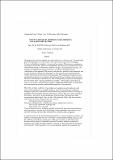| dc.description.abstract | Meanings of key words are defined, and some of the writer's biases noted. The underlying
question of the paper is to what extent, with research on poverty, there are linkages
between methodologies, mindsets, concepts and perceptions. Three streams, syndromes or
paradigms are described. The first is standardised, non-contextual and quantitative and is
about income poverty, Poverty Lines, statistical analysis, and questionnaire surveys. The
methods and mindsets of many economists are associated with and sustain the
reductionism of this approach. The second is idiosyncratic, qualitative and contextual, and
is about poverty in cultures and communities as conceived and expressed through the
intimate interaction of researchers and local people. The methods and mindsets of many
social anthropologists are associated with and sustain the particularism of this approach.
The third is participatory and interactive, and is about poverty as expressed and analysed
by local people, often in groups facilitated by outsiders. The mindsets and methods of
many in civil society, and increasingly of others independent of discipline, are associated
with and sustain the pluralism and multidimensionality of this approach.
These three streams, syndromes or paradigms can supplement and complement each
other, and do not have to be mutually exclusive. Each has strengths and weaknesses.
Attempts to gain from combinations inch/deconstructing composite indices and mixing the
quantitative and qualitative methods of the first two streams. The poM>er and potential of
participatory approaches and methodologies (PMs) go further, but have been under
recognised and undervalued. Since the late 1980s and early 1990s, PMs have exploded
with creative diversity. Relating to poverty some are:
Participatory Poverty Assessments;
Inventions and applications including participatory numbers and statistics;
Face-to-face experiential learning; and
Local people's own research.
Practical lessons concern: innovating methods to fit specific topics and local conditions,
requiring plenty of time for trials and piloting; the key importance offacilitators, their
selection, training and mentoring; and behaviour, attitudes, ethics and quality.
A way forward now is for development professionals to be more courageous, inventive and
reflexive in the approaches they use in research to understand the illbeing of poverty and
the wellbeing to which poor people aspire. The quiet revolution to which this points
demands radical change in embedded professional methods, mindsets, attitudes and
behaviours. As of2007, the seeds of such a revolution are there but scattered, threatened
and vulnerable. Unfortunately for poor and marginalised people, the recognition, let
alone creation and adoption, of PMs are blocked by massive professional, academic,
bureaucratic and institutional inertia. Innovation and adoption seem to vary inversely
with power, with high status econometrics and the World Bank's research trapped in a
sclerotic conservatism that impedes innovation and change. The challenge is to transform
tertiary education, research institutes, and other citadels of professional power and
knowledge, liberating them from their learning disabilities, and opening up potential for
endless adventures in experiencing and learning. Success in this struggle would be a winwin:
for professionals it would bring enhanced understanding and more realism and
relevance to their work; and for those who suffer the multiple deprivations ofpoverty,
more chance of a better life. | en_GB |

